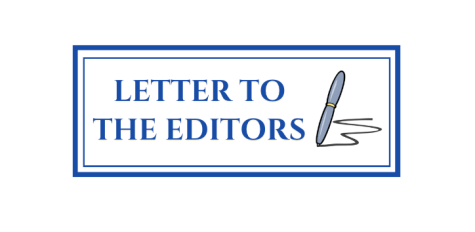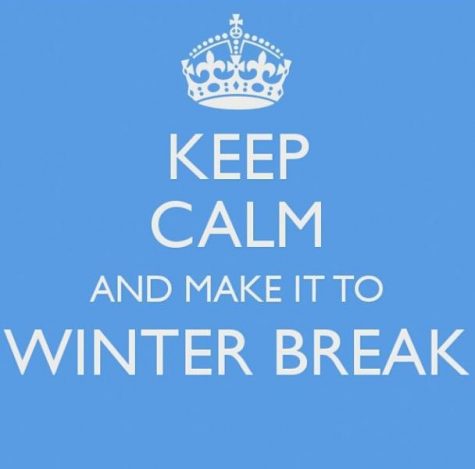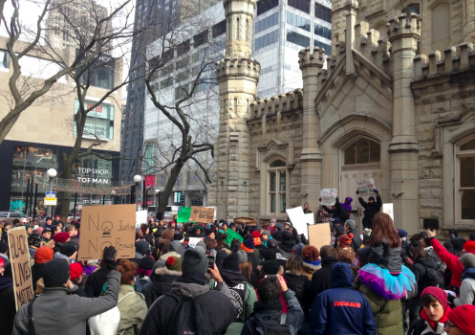Letter to the Editors: Viewing Hoda Katebi Through a Different Lens
Growing up a Latina Jew, I have always struggled with expressing my identity because it is not what is expected of somebody who looks like me. Following the backlash caused by the “Difficult Dialogues” panel on women-led protests and revolutions on January 5, the power of choice, and the current social unrest and powerful resistance against the Iranian regime, I feel I finally need to share my opinion.
Some of the Latin community has rallied against one of the panelists, Hoda Katebi, for her ties to the Boycott, Divestment, and Sanctions (BDS) movement, as well as what many believe to be antisemitic comments that she has made criticizing the state of Israel and supporting Palestinian resistance including the burning of Israel’s flag. While acknowledging the sensitive nature of this topic and genuine concerns from those who fear her presence in the school as one condoning antisemitism, I am here to tell you why I don’t believe her to be antisemitic and why I believe that her presence in the school was crucial, exceptional, and necessary.
BDS is a Palestinian-led movement that calls for the withdrawal of the separation barrier in the West Bank, Israeli withdrawal from occupied territories, full social equality for Palestinian-Arab citizens, and providing support for Palestinian refugees in their return to their homes. Its way of forcing Israel’s hand is by urging universities and other entities to stop sourcing and funding companies from Israel to economically isolate the nation in order to cut off its lifeline and force the country to stop committing human rights violations against Palestinians. The movement is modeled after anti-apartheid efforts established in South Africa, as some believe the Israel-Palestine situation to be one of apartheid against Palestinians. The Israeli government is threatened by the goals of BDS and by its popularity and power amongst college campuses and the international community, so the government has been labeling the movement as antisemitic and has wanted it to be banned since 2015.
An important distinction to be made is that BDS is against the humanitarian abuses, colonizer tactics, and power dynamics established in Israel-controlled Palestine as well as the treatment of Palestinians as second-class citizens. BDS is not anti-Jewish, but it is anti-Israel. The battle that BDS is fighting is not with Jews as a whole but with Israel’s relationship with Palestinian people. That distinction is important because Israel is a political entity and Judaism is a religion. Although there is an intersection between the two in this context, being opposed to a country’s actions does not inherently mean that you are opposed to the religion or the country itself. These must be kept separate in order to address the conflict in a productive way.
Hoda Katebi, along with many other liberal colleges across the country, supports BDS and is against Israel’s actions toward Palestinians. Ms. Katebi’s opposition to the country’s actions as a political entity does not make her stances antisemitic. Dr. June introduced the panel, which was set to talk about the women-led revolution in Iran with no mention of the Israel-Palestine conflict. He made clear that not everyone had to agree with what was presented or even with the panelists themselves, and it was being presented simply as food for thought. The panel was meant to offer perspectives that might be different from some students and to help engage our critical thinking skills. By acknowledging the desire for students to make their own opinions from what the panelists said, Ms. Katebi’s presence was justified and validated. She is Iranian-American and was there to speak on the revolution in Iran. She offered necessary background information on the significance of the situation in the country and the factual events for those who were not up to date, and offered her own insights on how it affected her, what her reactions were to the conflict, and what she hoped it would inspire in other people.
Another point of tension for many students was Ms. Katebi’s tweets that called Palestinian oppression in Israel genocidal. Using that terminology is her prerogative as an individual. People may agree or disagree, but she has the right to make claims about it. The act of genocide may be committed by other ethnic groups or by nations. There is no reason to believe that in her calling it a genocide she was holding Jewish people as the actors but more so Israel as the political entity that it is. The two cannot be misconstrued, because the actions of the nation do not represent Jews, and criticizing the nation is not in itself antisemitic. The same goes for her controversial tweets that supported the burning of the Israeli flag by Palestinian resistance. The flag is a political symbol, not a religious one despite the nation’s flag including the Star of David. The burning of flags is a common symbol of political resistance that happens all over the world.
Additionally, there has been some controversy regarding the attention on Israel when there are other nations that commit the same acts of violence or have done so on a larger scale. I would like to remind everyone that death and destruction is not a competition. There should be no comparison of crises as to which is worse. Trauma is trauma. Death is death. The existence of violence and oppression in other nations does not invalidate the continued struggle of Palestinians and does not exonerate Israel of its role in their continued oppression.
Latin does not frequently, in its curriculum or in school-wide events, center on women of color. In this instance, highlighting women of color with direct connections to the conflict while centering a region of the world not emphasized in our curriculum is something incredibly valuable that felt like a breath of fresh air. Especially when presenting to a predominantly white institution where students may not feel inherently connected to the conflict or may not have seen many instances where women of color are centered, the panel was uniquely important. The panelists themselves, their insights and perspectives, as well as knowledge of the situation created a thoughtful, informative, and significant discussion that students will remember.
I would like to extend a profound thank you to Lucie Wright and Dr. Matthew June for their continued commitment to the Difficult Dialogue programming and for providing Latin students with a unique opportunity to explore different perspectives and regions of the world. “Difficult” is in the title of the program, and that is what these conversations will continue to be. These discussions are imperative to our critical thinking and furthering our understanding of the world and differing perspectives. My hope moving forward is that we are able to center the ongoing resistance in Iran in our conversations and as the takeaway from the panel, as that was the initial intention of the dialogue. Let’s give the brave people of Iran who are engaging in the resistance the attention and respect they deserve, and let us apply what we heard to our own lives as we continue on with this journey of learning.
Amanda Valenzuela (’23) is excited to be a staff writer this year. Her favorite class subjects are English and history and she loves to write about current...






















































Trent Glimp • Jan 11, 2023 at 12:22 am
I will start in a place, Amanda, of saying that I can appreciate you coming out and sharing an alternative viewpoint that you believe as a Jewish woman. Your viewpoint is one that I am sure other Jewish people, more specifically, Jewish members of the Latin community share.
I feel that my opinion of BDS and Hoda Katebi in a discussion of anti-Israel versus antisemitic does not hold much if any importance because I am not Jewish, meaning, I don’t have to face and deal with the issue as one that is personal. Because of this, I will only focus on what I do know and what does affect me: the emotions and feelings of people close to me.
In the days since the panel, I have seen some of my closest friends in more rough shape than I have ever seen them in my time knowing them. Feelings of hopelessness, anxiety, depression, and more are the emotions tormenting and plaguing some of those most important to me in the Latin community.
At this point, I feel that we all, as a community, have strayed away from what the problem is. Hoda Katebi and BDS being antisemitic or anti-Israel is something that people can and should debate. However, what cannot be debated is that students reached out to the administration because they felt that bringing Hoda Katebi to our “Difficult Dialogue” about the protests of Iranian women was harmful to both them and people with shared beliefs. In letting Hoda Katebi be on the panel, the school made the feelings of those people worsen.
Now, what we need to focus on must change. More important than any opinion that anybody could have are people’s emotions. I ask that people reading this focus more, or at least as much, on the emotions of the people involved as they do the discussions and opinions of the matter. This way is the only way to move forward as a safe Latin community for all of us.
Evan Jones • Jan 11, 2023 at 2:00 pm
I agree with your comment Trent about how the panel has negatively impacted Latin’s student body. Latin’s student’s well-being should be the first priority of every school initiative, and this might have been an oversight. If you put the anti-Israel vs. anti-semitism argument aside, there is a large group of students who have negatively reacted to this panel.
I do believe, however, that dialogues are crucial, regardless of whether or not they have negative impacts on students’ emotions. Avoiding difficult conversations and topics shelters students from history and the ability to distinguish their own truth. Discussing these topics combat ignorance, blissful as it may be, and educate the community.
I agree with your point about more preparation before issues like this. I am unaware of what transpired before the panel, however, perhaps reaching out to affinity group heads before the next speaker could be a beneficial change. It is impossible to cater to 500+ students’ needs and opinions but considerations like these are important.